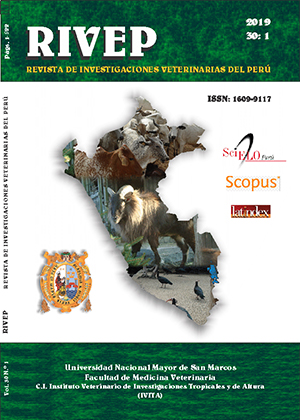Effect of pre-partum supplementation with calcium chloride on the serum concentration of minerals and productive aspects in Carora cows
DOI:
https://doi.org/10.15381/rivep.v30i1.15675Keywords:
calcium chloride; cows; hypocalcaemia; milk productionAbstract
The aim of this study was to evaluate the effect of pre-partum supplementation with an anionic diet on serum mineral concentrations during the peripartum, occurrence of subclinical hypocalcaemia, retention of foetal membranes and milk production in the first 100 days postpartum. A completely randomized design was used, with 24 Carora cows distributed in two groups: one group supplemented with 100 g of calcium chloride/cow/day between 21 days before the probable date of calving and the day of calving with a BCAD of 9.6 mEq/100 g of MS, and a non-supplemented group. The urinary pH was determined twice a week between day -21 and day 1 of parturition. Serum calcium, phosphorus and magnesium concentrations were determined on days -21, -14, 1, 15 and 30 of calving. Subclinical hypocalcaemia was determined if the serum calcium values were lower than 7.5 mg/dl on days 1 and 15 postpartum. Milk production was determined by monthly weighing records. A decrease in urinary pH was found on days -14, -7 and 1 in the supplemented group (p<0.01). Supplementation with 100 g/cow/day of calcium chloride in the pre-partum increased serum concentrations of magnesium and phosphorus, but serum calcium levels remained like those in the non-supplemented group. Calcium chloride supplementation in the pre-partum did not improve Ca2+ homeostasis or prevent the occurrence of metabolic diseases such as hypocalcaemia and retention of foetal membranes in the postpartum, nor did it increase milk production.
Downloads
Downloads
Published
Issue
Section
License
Copyright (c) 2019 Aura López-Ortega, Villany Villarreal, Adelys Márquez, Ysabel Márquez

This work is licensed under a Creative Commons Attribution-NonCommercial-ShareAlike 4.0 International License.
AUTHORS RETAIN THEIR RIGHTS:
a. Authors retain their trade mark rights and patent, and also on any process or procedure described in the article.
b. Authors retain their right to share, copy, distribute, perform and publicly communicate their article (eg, to place their article in an institutional repository or publish it in a book), with an acknowledgment of its initial publication in the Revista de Investigaciones Veterinarias del Perú (RIVEP).
c. Authors retain theirs right to make a subsequent publication of their work, to use the article or any part thereof (eg a compilation of his papers, lecture notes, thesis, or a book), always indicating the source of publication (the originator of the work, journal, volume, number and date).



